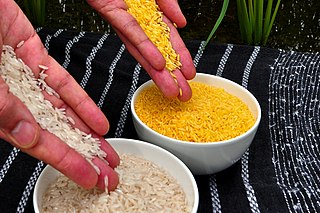All of which might leave me in a bit of a quandary. I am a member of both the AAAS and the UCS (though I must admit I trust the AAAS more for objectivity). I buy organic groceries at a local co-op to minimize ingestion of pesticides and hormones, to support more sustainable and humane farming practices, and to get a healthy dose of the placebo effect, which is, after all, quite real and quite potent. But in my day job as a molecular biology PhD student, I regularly GM my O's, since there's no other way to understand what genes do. (My research has been fairly basic although inspired by eventual applications, and I haven't worked with crops.) So as an informed, rational, tree-hugging hippie, where should I fall on this issue? Like any good scientist, I went straight to the sources and evaluated their arguments.
As with many disagreements, the two sides seem to be simply talking past each other, making different and non-contradictory points. The problem lies in painting all GMOs with the same brush, and in separating science from policy advice.


Left: Golden rice was engineered with the best of intentions to contain beta carotene. This would fight vitamin A deficiency in an estimated 190 million people, for many of whom rice is an important staple crop. Right: Some of the more controversial GMOs are resistant to the herbicide Roundup, encouraging heavy spraying in fields. Images: International Rice Research Institute and PI77 of wikimedia commons.First for the science. Genetic engineering is simply a tool. Like any tool, it can make good things and it can make bad things. Good things example: vitamin-enhanced foods that fight malnutrition. Potentially bad things examples: soybeans containing a brazil nut gene that could cause allergic reactions, and Roundup resistance that encourages heavy herbicide use, which can promote resistance and cause health and environmental effects. In referring to the tool, then, the AAAS is correct that "crop improvement by the modern molecular techniques of biotechnology is safe." At the same time, In referring to the products the UCS is also correct that some GM crops could cause health effects or environmental damage. So scientific conclusion: genetic engineering as a tool is perfectly benign, but the products of that tool might be or might not be.
Next, the current policy landscape. Here the AAAS and the UCS have different interpretations, with the AAAS saying that "in order to receive regulatory approval in the United States, each new GM crop must be subjected to rigorous analysis and testing." The UCS counters that "the FDA review process for GE [genetically engineered] foods is voluntary, and provides no detailed guidance on how to test GE foods to ensure their safety." Here I'll have to admit that I don't know enough about regulation and testing to know which group is correct. However, I'd venture to guess that GMO regulations grew hodgepodge out of agencies not used to dealing with them, and could likely stand some thoughtful updating.
Which brings us to the crux of the question: the policy response. The AAAS thinks current policy is sufficient, the UCS thinks we need better testing and mandatory labeling. I could agree with redesigning regulations and testing for the biotech era. But mandatory labeling treats all the products of the tool in the same way. A mandatory label would treat thoroughly tested and completely safe GMOs exactly the same as crops engineered to produce iocaine powder. That doesn't make any more sense than slapping yogurt with the same surgeon general's warning found on whiskey.




These products were both produced via fermentation followed by distillation. Should they bear the same surgeon general's warning? Images: Algont of Wikimedia Commons and Enrico Uva
If the problem is with allergic reactions, require labels on potentially allergenic GMOs. If the problem is with herbicide resistance, put labels on those GMOs. But lumping all GMOs together under the same label implies that the genetic engineering tool itself is unsafe, and that is clearly not true. The only reason to support universal mandatory labeling would be if you were fundamentally against the tool based on principle rather than science.
So, as a Californian minus one week, I say this to my future co-residents. Support sensible GMO testing and regulation. Eat organic, especially if you are pregnant or a baby. Support sustainable and humane agriculture. But recognize that genetic engineering is a tool that can advance all the ideals that "organic" (possibly falsely) means to people. And, vote no on Prop 37 as written.





Comments